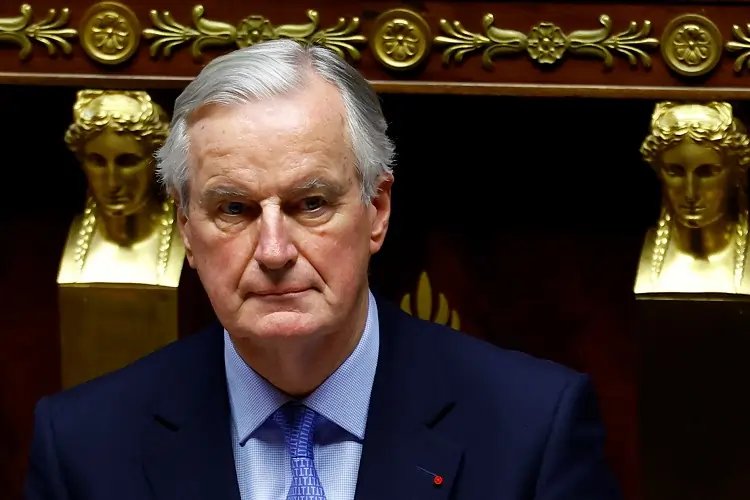Prime Minister Barnier to resign as France’s political crisis deepens


By Bertrand Boucey and Sudip Kar-Gupta
PARIS (Reuters) -French Prime Minister Michel Barnier will resign on Thursday after far-right and leftist lawmakers voted to topple his government, plunging the euro zone’s second-largest economy deeper into political crisis.
Barnier, a veteran politician who was formerly the European Union’s Brexit negotiator, will be the shortest-serving prime minister in modern French history after he hands in his resignation at around 10 am (0900 GMT). No French government had lost a confidence vote since Georges Pompidou’s in 1962.
The political turmoil further weakens a European Union already reeling from the implosion of Germany’s coalition government, and comes weeks before U.S. President-elect Donald Trump returns to the White House.
The hard left and far right punished Barnier in a no-confidence vote on Wednesday evening for trying to push an unpopular budget through an unruly hung parliament without a vote. The draft budget had sought 60 billion euros ($63 billion) in savings in a drive to shrink a gaping deficit.
Barnier’s resignation caps weeks of tensions over the budget, which Marine Le Pen’s far-right National Rally said was too harsh on working people.
It also further weakens the standing of President Emmanuel Macron, who precipitated the ongoing crisis with an ill-fated decision to call a snap election in June.
Macron, who faces growing calls to resign, has a mandate until 2027 and cannot be pushed out.
Still, the long-running political debacle has left him a diminished figure. An online poll carried out just after the no-confidence motion showed 64% of voters want Macron to resign.
“The main culprit for the current situation is Emmanuel Macron,” Le Pen told TF1 TV late on Wednesday. “The dissolution (of parliament in June) and censorship (of the government) are the consequence of his policies and of the considerable divide which exists today between him and the French.”
A small majority of voters approved parliament bringing down Barnier, but many were still worried about its economic and political consequence, the Toluna Harris Interactive poll for RTL broadcaster showed.
France now risks ending the year without a stable government or a 2025 budget, although the constitution allows special measures that would avert a U.S.-style government shutdown.
Three sources told Reuters that Macron aimed to install a new prime minister swiftly, with one saying he wanted to name a premier before a ceremony to reopen the Notre-Dame Cathedral on Saturday, which Trump is due to attend.
But any new prime minister will face the same challenges as Barnier in getting bills, including the 2025 budget, adopted by a divided parliament. There can be no new parliamentary election before July.
“Until potential new elections, ongoing political uncertainty is likely to keep the risk premium on French assets elevated,” SocGen analysts said in a note. “Political uncertainty is likely to dampen both investment and consumer spending.”
The political uncertainty has already been unnerving investors in French sovereign bonds and stocks for weeks.
The risk premium investors demand to hold French debt rather than German Bunds stood close to its highest level in over 12 years on Thursday.
French conservative politician Xavier Bertrand said he felt a mix of anger and shame over the no-confidence vote.
“It’s as if the two extremes, (the hard left) France Unbowed and the National Rally, have become the centre of political life,” he told BFM TV.
(Additional reporting by Dominique Vidalon, Zhifan Liu; Writing by Ingrid Melander and Gabriel StargardterEditing by Bill Berkrot and Peter Graff)
A financial crisis is a situation where the value of financial institutions or assets drops significantly, leading to widespread economic instability.
A budget deficit occurs when expenses exceed revenues, leading to a shortfall that must be financed through borrowing or other means.
Explore more articles in the Top Stories category











